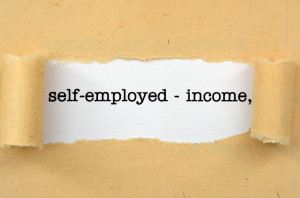In principle, lending money to a self-employed person is not any worse than lending money to an employed person. But we have seen examples of where lenders fail to get to grips with how a self-employed person’s income works differently to that of an employed person. And this can result in a misunderstanding of what the true income is, leading to an irresponsible lending decision.

Some customers will consider themselves self-employed, but it does not necessarily follow that they are earning any money from their business or trade:
‘I find what Mr P has said to be credible and I note that on the form he filled in he says he is a ‘building contractor’ – which backs up his story that he told the broker he was self-employed. And the ‘time with employer’ box has been left blank, which shows that he hasn’t started the work yet (or hasn’t been doing the job very long).’
‘And had some checks been made to see if Mr P could meet the payments, it would have been quite clear that he wasn’t earning anything when he took out the agreement. His bank statements prior to taking the finance show low or overdrawn monthly balances and no obvious regular wage. It would be quite clear that at the time the finance was sold he couldn’t afford payments of £330 a month to finance the car.’
‘I understand that Mr P signed the agreement, and that he would probably have understood what he was signing up too. But it is the duty of the lender to ensure that it lends responsibly and that the repayments are sustainable. I don’t think enough was done in this case, and ultimately I think that if more was done it would have been clear that the lending was unaffordable at the point of sale. And although he may have misjudged his potential earnings as a contractor I don’t think that Mr P intentionally misled the broker, or prevented it from making reasonable checks based on the information he gave it.
I think that as the lending was unaffordable at the point of sale the finance should be cancelled and Mr P should be able to return the car.’
(https://www.financial-ombudsman.org.uk/decision/DRN1688272.pdf)
An amount a self-employed person receives into their bank account in any one month is not going to reflect a true net income. The reality is that once the self-employed person has submitted their tax return, their earnings – and therefore the money they have available to repay loans – will be less:
‘Here, I’d seen that Mr M was, at the time he entered into the credit agreement, working on a temporary contract and was self-employed. This meant that all payments he was receiving were gross and not net as had been assumed by Moneybarn.
Moneybarn calculated that Mr M had a net monthly income of £5,133.70, based on the payments he’d received from a company over the two months covered by the bank statements. This equated to an annual income of around £90,000. However, Mr M had provided me with his tax returns for the years 2017/18 and 2018/19, which showed Mr M earnt £34,000 and £29,500 respectively. I thought it was fair to say that Mr M’s annual income wasn’t close to £90,000 and the calculation by Moneybarn of Mr M’s net monthly income had been inaccurate and inflated.
As Mr M was self-employed, I thought it was more likely than not that his income would fluctuate, and I’d seen Moneybarn would also have accepted that. However, if he had been asked about his income by Moneybarn at the point he entered into the credit agreement, then I thought it was more likely than not that he would have declared it as £34,000. This figure would have been corroborated by the amounts he was shown as being paid in his bank statements. This would mean the monthly payments for the conditional sale agreement were around 16% of his income’
(https://www.financial-ombudsman.org.uk/decision/DRN-3299692.pdf)
Some self-employed people are Directors of their own companies. Lenders could potentially unearth a complex financial picture of business expenses, transfers between different accounts and debts relating to the customer’s own company:
‘Mr B was described as a ‘Director’ on the agreement so I didn’t think it was beyond reasonable for Black Horse to have asked about the nature of his employment;’
‘I can see about £39,000 deposits in over these months and about £34,000 transfers out to two payees: Mr B’s wife and a company. Disregarding everything else, this doesn’t leave enough for Mr B to meet his repayments each month. It’s clear from the bank statements that the amount of money Mr B had access to varied considerably, for example he incurred unarranged overdraft fees in the months before the agreement despite the large deposits. It’s also clear that Mr B had business interests and paid significant sums to his wife each month.
Mr B explained to this Service that he was the sole owner of a company at that time – he drew a salary of £1,000 a month (and provided income tax returns which support this) and he also took payment from the company by way of ad-hoc dividends to pay his bills. Mr B said his wife paid the mortgage and most of their bills and living costs, which at times included school fees for their two children. I understand that his business went into liquidation in early 2018.
Altogether, I don’t think it’s likely that any further information about Mr B’s financial affairs would have reassured Black Horse that he would have been able to meet his repayments sustainably and so I think it was irresponsible to have agreed to lend to him when it did.’
(https://www.financial-ombudsman.org.uk/decision/DRN-2911603.pdf)
If you were self-employed (or a Director of your own company) when you borrowed money you couldn’t afford to pay back, you can contact Allegiant to enquire about making a claim – to see if you are a victim of irresponsible lending.
